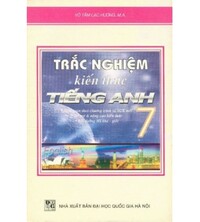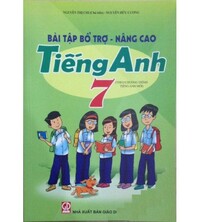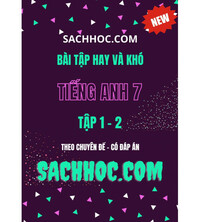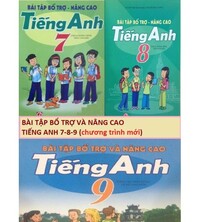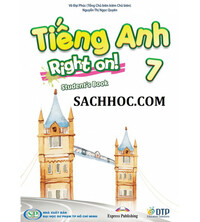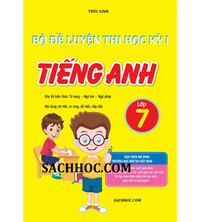Tiếng Anh 7 Unit 5 Vocabulary and Listeing: Jobs and skills
THINK! At what ages can most people talk, walk, count, spell their name, read, write? When could you first speak English? 1. Choose the correct bold words in the texts. Listen and check. 2. PRONUNCIATION /ə/ in jobs (PHÁT M / ə / trong công việc) Listen to the jobs. Then listen again and repeat. 3. Listen to more jobs and skills. Find the words you hear in the text in exercise 1. Listen again and repeat the words. 4. Listen to part of the programme and write True or False. 5. USE IT! Work
THINK!
THINK! At what ages can most people talk, walk, count, spell their name, read, write? When
could you first speak English?
(SUY NGHĨ! Hầu hết mọi người có thể nói, đi, đếm, đánh vần tên, đọc, viết ở những độ tuổi nào? Bạn có thể
nói tiếng Anh lần đầu tiên khi nào?)
Lời giải chi tiết:
Most people can talk, walk, count at the age of 2 and they can spell their name, read, write at the age of 6. I
could first speak English when I in grade 1.
(Hầu hết mọi người có thể nói, đi, đếm lúc 2 tuổi và họ có thể đánh vần tên, đọc, viết lúc 6 tuổi. Tôi có thể
nói tiếng Anh lần đầu tiên khi tôi học lớp 1.)
GENIUS!
Grace Hopper
A mathematics (1) expert / artist and computer (2) programmer / winner. She was also a university (3)
inventor / professor.
Marie Curie
The (4) artist / scientist who discovered radium. First female (5) winner / writer of the Nobel prize for
physics.
Judit Polgár
Number one female (6) genius / player in the world from the age of twelve, and the best female chess
player in history. She beat the world (7) champion / winner, Garry Kasparov, in 2002.
Wolfgang Amadeus Mozart
A talented (8) musician / scientist and (9) composer / programmer.
Charles Dickens
One of the greatest (10) champions / writers in the English language.
Leonardo da Vinci
A (11) mathematician / champion, scientist, inventor and artist. Leonardo was a (12) genius / player
with many different talents.
Bài 1
1.Choose the correct bold words in the texts. Listen and check.
(Chọn các từ in đậm chính xác trong các văn bản. Nghe và kiểm tra.)
Lời giải chi tiết:
|
1. expert (chuyên gia) |
2. programmer (lập trình viên) |
3. professor (giáo sư) |
|
4. scientist (nhà khoa học) |
5. winner (người chiến thắng) |
6. player (cầu thủ) |
|
7. champion (nhà vô địch) |
8. musician (nhạc sĩ) |
9. composer (nhà soạn nhạc) |
|
10. writers (nhà văn) |
11. mathematician (chuyên gia toán học) |
12. genius (thiên tài) |
GENIUS!
Grace Hopper
A mathematics expert and computer programmer. She was also a university professor.
Marie Curie
The scientist who discovered radium. First female winner of the Nobel prize for physics.
Judit Polgár
Number one female player in the world from the age of twelve, and the best female chess player in history.
She beat the world champion, Garry Kasparov, in 2002.
Wolfgang Amadeus Mozart
A talented musician and composer.
Charles Dickens
One of the greatest writers in the English language.
Leonardo da Vinci
A mathematician, scientist, inventor and artist. Leonardo was a genius with many different talents.
Tạm dịch:
THIÊN TÀI!
Grace Hopper
Một chuyên gia toán học và lập trình viên máy tính. Bà ấy cũng là một giáo sư đại học.
Marie Curie
Nhà khoa học đã phát hiện ra radium. Người phụ nữ đầu tiên đoạt giải Nobel vật lý.
Judit Polgár
Nữ kỳ thủ số một thế giới từ năm mười hai tuổi, và là nữ kỳ thủ giỏi nhất trong lịch sử. Cô đánh bại nhà vô
địch thế giới, Garry Kasparov, vào năm 2002.
Wolfgang Amadeus Mozart
Một nhạc sĩ và nhà soạn nhạc tài năng.
Charles Dickens
Một trong những nhà văn vĩ đại nhất viết bằng ngôn ngữ tiếng Anh.
Leonardo da Vinci
Một nhà toán học, nhà khoa học, nhà phát minh và nghệ sĩ. Leonardo là một thiên tài với nhiều tài năng
khác nhau.
Bài 2
2.PRONUNCIATION /ə/ in jobs (PHÁT ÂM / ə / trong công việc)
Listen to the jobs. Then listen again and repeat.
(Lắng nghe các công việc. Hãy nghe và lặp lại.)
1 programmer
2 professor
3 inventor
4 teacher
5 writer
6 player
7 composer
Lời giải chi tiết:
1 programmer /ˈprəʊɡræmər/: lập trình viên
2 professor /prəˈfesər/: giáo sư
3 inventor /ɪnˈventər/: nhà phát minh
4 teacher /ˈtiːtʃər/: giáo viên
5 writer /ˈraɪtər/: nhà văn
6 player /ˈpleɪər/: cầu thủ
7 composer /kəmˈpəʊzər/: nhà soạn nhạc
Bài 3
3.Listen to more jobs and skills. Find the words you hear in the text in exercise 1. Listen again
and repeat the words.
(Lắng nghe nhiều công việc và kỹ năng hơn. Tìm những từ bạn nghe được trong văn bản ở bài tập 1. Nghe
lại và lặp lại các từ.)
Bài 4
4. Listen to part of the programme and write True or False.
(Nghe một phần của chương trình và viết Đúng hoặc Sai.)
1 Clare isn’t very good at maths.
2 Mozart couldn’t compose music when he was eight.
3 Most children can read when they’re six.
4 Leonardo da Vinci wasn’t very good at spelling.
5 Kieron Williamson had £22,000 from his art when he was ten.
Phương pháp giải:
1 Clare không giỏi toán lắm.
2 Mozart không thể sáng tác nhạc khi mới 8 tuổi.
3 Hầu hết trẻ em có thể đọc khi lên sáu tuổi.
4 Leonardo da Vinci không giỏi chính tả.
5 Kieron Williamson đã kiếm được 22.000 bảng từ tác phẩm nghệ thuật của mình khi mới 10 tuổi.
Bài 5
5.USE IT! Work in pairs. Use comparative and superlative forms of the adjectives in the box to
compare jobs.
(THỰC HÀNH! Làm việc theo cặp. Sử dụng các dạng so sánh hơn và so sánh nhất của các tính từ trong hộp
để so sánh các công việc.)
|
boring difficult easy exciting |
A: I think it’s probably interesting to be a writer.
(Tôi nghĩ việc trở thành một nhà văn có lẽ rất thú vị.)
B: I agree with Dani, but I think it’s probably more useful to be a scientist.
(Tôi đồng ý với Dani, nhưng tôi nghĩ việc trở thành một nhà khoa học có lẽ hữu ích hơn.)
Phương pháp giải:
|
boring (tẻ nhạt) difficult (khó khăn) easy (dễ dàng) exciting (lý thú) good (tốt) interesting (thú vị) useful (hữu ích) |
Lời giải chi tiết:
A: In my opinion, being a composer is maybe really exciting.
(Theo tôi, trở thành một nhà soạn nhạc có lẽ rất thú vị.)
B: I think so, too, but I think it is more interesting to be a inventor.
(Tôi cũng nghĩ vậy, nhưng tôi nghĩ sẽ thú vị hơn khi trở thành một nhà phát minh.)
A: For me, it’s probably difficult to be a scientist.
(Đối với tôi, có lẽ rất khó để trở thành một nhà khoa học.)
B: I absolutely agree with you, I think it is easier to be a teacher.
(Tôi hoàn toàn đồng ý với bạn, tôi nghĩ làm giáo viên dễ hơn.)
A:I think it’s maybe boring to be a player.
(Tôi nghĩ trở thành một tuyển thủ có lẽ rất nhàm chán.)
B: I don’t think so. I think it’s much more interesting than being a writer.
(Tôi không nghĩ vậy. Tôi nghĩ điều đó thú vị hơn nhiều so với việc trở thành một nhà văn.)
A:In my opinion, being a teacher is good.
(Theo tôi, trở thành một giáo viên thì tốt.)
B:Well, I think it’s maybe better to be a scientist.
(Chà, tôi nghĩ tốt hơn là trở thành một nhà khoa học.)
Search google: "từ khóa + timdapan.com" Ví dụ: "Tiếng Anh 7 Unit 5 Vocabulary and Listeing: Jobs and skills timdapan.com"


